Alan Pakula’s Klute (1971): Criterion Blu-ray review
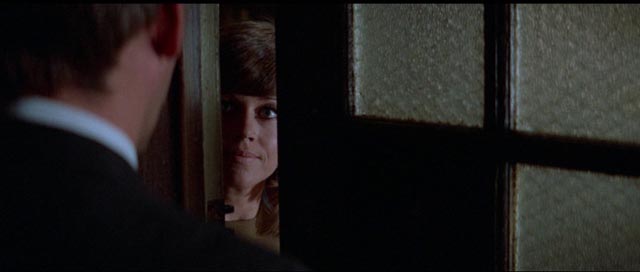
Alan Pakula had an odd career. He began producing movies in 1957. From Fear Strikes Out that year, until The Stalking Moon in 1968, Pakula produced seven features, all directed by Robert Mulligan. Their successful partnership is best remembered for the 1962 adaptation of Harper Lee’s To Kill a Mockingbird, a film which signaled a commitment to quality with a middle-brow liberal bent. The other defining characteristic of the pair’s work was an eclectic choice of subject matter which reflected a sensibility more akin to the classical Hollywood studios than to the new independent auteur.
When Pakula turned to directing in 1969, his own work followed a similar pattern. As a filmmaker, he subsumed himself to the demands of the material which interested him on a case by case basis, rather than seeking projects which might define his own directorial personality. If there’s a consistency to his films, it resides in a clean, rather formal visual style and a keen attention to performance, the latter reflecting his training in theatre.
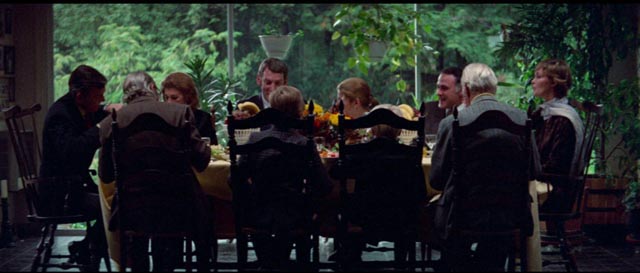
Pakula’s visual style was forged in his collaboration with Gordon Willis on Klute (1971), his second feature as director (after The Sterile Cuckoo [1969]). A film steeped in moral uncertainty and confused motives, Willis gives Klute an ominous, claustrophobic visual signature which at times obscures more than it reveals. (It was in this period, particularly with The Godfather [1972], that Willis was dubbed “the prince of darkness”.) The style is entirely appropriate here in the story of a smalltown cop searching for a missing friend in New York, an investigation which gets him involved with a call girl and, eventually, a serial killer.
The narrative elements are standard noir, but the film confounds expectations in a number of ways, not least in giving us an oddly passive, seemingly inexpressive protagonist in John Klute (Donald Sutherland), who blends into the texture of the narrative while call girl Bree Daniels (Jane Fonda) becomes the central concern. As if to confirm that this is a character study with incidental genre elements, the identity of the killer is casually revealed – to the audience, but not to the characters – about a third of the way in. Klute isn’t a classic whodunit, but rather a modernist (or postmodern) who-is-she, reflecting the nouvelle vague more than Hitchcock, who superficially seems to be an influence.
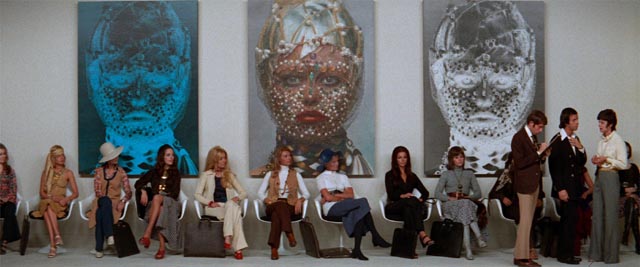
Absence and misperception run through the film from the opening moments. A group of friends are gathered for Thanksgiving dinner. We don’t know these people yet, but we register little details of behaviour – as if Pakula is fine-tuning our observational skills. We see Klute as a fastidious, self-conscious eater; we see a deeply ingrained affection in the married relationship between Tom Gruneman (Robert Milli) and his wife Holly (Betty Murray). Bright daylight through the big windows cuts abruptly to gloom and a closeup of an empty chair. Policemen are questioning Holly about her husband’s habits … and revealing that among the effects in his office desk they have found an obscene letter addressed to a prostitute in New York. Life’s comfortable certainties have been upended; Tom has vanished and it appears he was not the man his family and friends thought they knew.
After months of failed investigation, Tom’s business partner Peter Cable (Charles Cioffi) hires their friend John Klute to go to NYC to see if he can pick up the trail. It’s not the kind of police work he’s used to in a small Pennsylvania town, and all he has to go on is the obscene letter and the name of the prostitute, who a couple of years earlier had been viciously beaten by a john who may or may not have been Tom. Bree wants nothing to do with Klute or the investigation, so he sets up surreptitious surveillance of her run-down apartment.
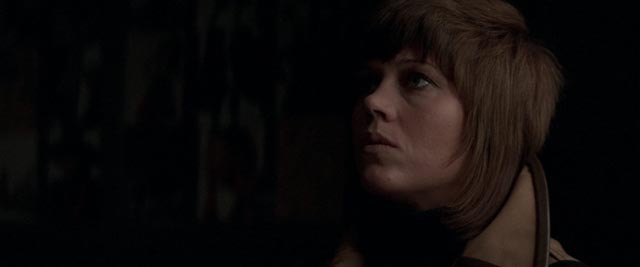
Bree was once a very successful high-end call girl; although she’s been trying to get out of the life, she’s still turning tricks while she looks for modelling and acting jobs. We first meet her trying out for a cosmetics ad, surrounded by models who simply emphasize her lack of artificial polish. Later we see her auditioning for a play and it’s obvious that she definitely has talent. But turning tricks is the only sure way to make money, and she takes pride in her skill … it’s a form of performance in which she takes control of the situation, guiding and shaping the johns’ fantasies. But that type of control is itself an illusion, a kind of protective armour, because even with her displays of self-assurance contrasting with their nervous self-consciousness, stripped to their essence, these encounters are rooted in the exchange of money, and the john ultimately has the real power. No matter how skillfully she manufactures fantasy, it’s always in service of some man’s pleasure; to those men she’s not an autonomous woman with her own needs and feelings but rather a temporarily purchased commodity (which is why she was so vulnerable to that violent john two years earlier).
The paradox at Bree’s core is explored in a number of ways through Fonda’s intense and layered performance. We see her with several clients, for whom she performs in a number of different ways; we see her in sessions with a sympathetic yet probing psychologist (a potential cliche which gains depth as Fonda – improvising – gradually becomes aware of hidden impulses which are shaping her behaviour); we see her with other prostitutes, with her former pimp, and we see her with Klute.
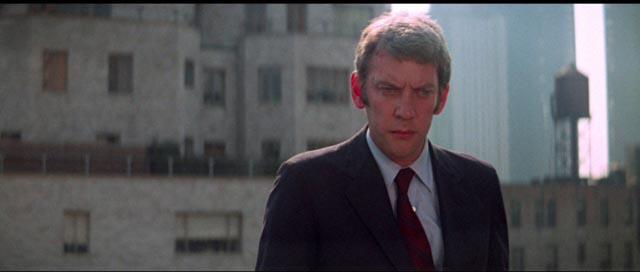
Bree’s progress towards self-knowledge gains impetus from Klute’s presence. Sutherland gives an interesting performance which risks disappearing in the presence of Fonda’s fierce intensity. He’s quiet, reactive, holding back to observe rather than assert himself to move events. But he insinuates himself into Bree’s life and, reflected in his gaze, she begins to see herself more clearly, pushed to analyze the meaning of her own behaviour. There’s a key sequence in which she plays on her apparent vulnerability to draw out his protective instincts, leading to a tender sexual encounter which, when it’s over, she coolly exposes as a manipulative lie intended to humiliate him. His lack of anger turns the situation back on her; instead of striking a blow for her own independence, she’s merely brought herself face to face with her own insecurity and the problematic way she deals with it.
As the veneer of strength and independence cracks, Bree retreats into a former role, one in which she relinquished control to her pimp Frank Ligourin (Roy Scheider), retreating into an almost childlike lack of agency which hints at a history of abuse and subservience … suggesting, in fact, that her “career” is a result of and response to childhood abuse. The persona which had been created out of those experiences, and which had to a degree served her well – until the encounter with the violent john two years earlier and now Klute’s investigation into that event and the series of murders which seem to stem directly from it – that persona begins to crumble until she’s brought face to face with all its implications when the killer forces her to listen to a recording of one of her friends being murdered.
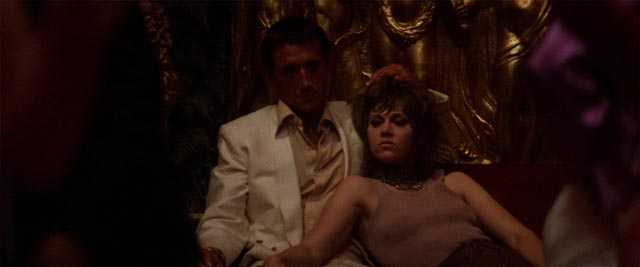
Klute, despite the title, is a film seen entirely from Bree’s perspective and, despite the mystery and suspense trappings, its subject is this woman’s deconstruction of her own identity and her search for a way to create a new one out of the fragments. The old identity and the new one, however, are both born within a context which gives men a degree of power against which her self-definition must fight. Klute with his empathy and the killer with his cold violence exist on a male continuum which imposes on Bree one kind of identity or another at every point. For a movie written by men (Andy Lewis and David Lewis), produced and directed by a man, and named for a male protagonist, Klute is a key text in the mainstreaming of feminist thought in the 1970s.
It’s also a key text in the explosion of paranoia in pop culture at the time, something attributable as much to Gordon Willis’ talents as a cinematographer as it is to Pakula’s skill as a director. Questioning the trustworthiness of knowledge, of the confidence with which one can believe the evidence of one’s own eyes, was in the air – politicians couldn’t be trusted; they lied about everything of importance, particularly the illegitimate war in Vietnam, and they used all the resources of the state to undermine people’s rights – and in a couple of years the establishment itself could no longer deny the corruption as Watergate brought down the Nixon administration. Paranoia made sense, conspiracies were hard to refute … and Klute helped to set the tone for the next decade, with Pakula reinforcing his position as a master of this unsettling genre with The Parallax View (1974) and All the President’s Men (1976), ending the decade with the underrated Rollover (1981).
*
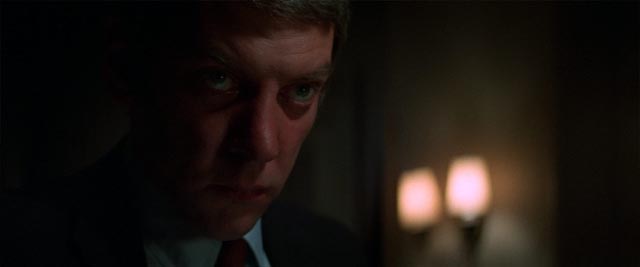
The Disk
A 4K transfer from the original camera negative produces a superb image on Criterion’s Blu-ray. The richness of Gordon Willis’ cinematography is done full justice, with velvet blacks and an almost tactile film-like texture. The restored mono soundtrack, with clear dialogue and Michael Small’s score, is spare yet atmospheric, providing an effective complement to the formal clarity of the images.
The Supplements
There are two-and-a-half hours of new and archival extras which illuminate the film’s cinematic and cultural context, with, not surprisingly, a strong emphasis on Jane Fonda’s performance and its relationship to her public persona and radical politics, “Klute” in New York (8:18) is a standard contemporary promo piece; Pakula talks about his process with actors on an episode of Dick Cavett’s talk show from 1978 (27:14); Fonda speaks candidly about her politics to English broadcaster Midge Mackenzie in a 1973 interview for British television (38:05). In new pieces, Ileana Douglas discusses the film and the role with Fonda (36:05) and fashion writer Amy Fine Collins discusses the film’s design (25:16). Finally, there’s a short (18:04) interview-based making-of culled from material gathered by filmmaker Matthew Miele for a documentary he’s making about Pakula.
The booklet contains an essay by Mark Harris and lengthy excerpts from an interview with Pakula conducted by Tom Milne for Sight & Sound in 1972.
The Klute Blu-ray is another exceptional release from Criterion which highlights the film’s importance to the evolution of American film at a particularly turbulent time in both politics and popular culture.
Comments